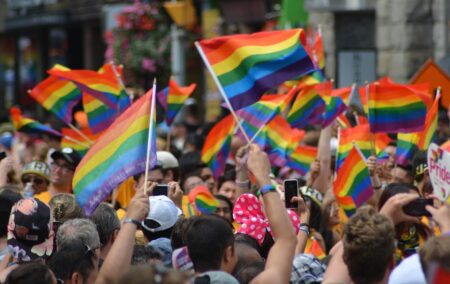Educating children on sexual orientation and gender identity is not ‘indoctrination’ or a push for the so called ‘gay agenda’. Instead, it instils in them the values of our liberal constitution, which promotes tolerance and acceptance of all who may be different from ourselves.
Make no mistake, however; South African schools will find this to be a difficult endeavour.
Recently, LGBT activist Mbulelo Xinana, from Sicebise Social Inclusion, spoke at a school in Nelson Mandela Bay to inform pupils on LGBTQ+ inclusion.
When he posted a photograph of himself talking to a large group of pupils, many who commented accused of him of ‘promoting homosexuality’ and trying to ‘turn children gay’. Some even accused him of being ‘militant’.
The responses seem to corroborate the finding of a 2016 study by The Other Foundation, which found that many South Africans do not want their children to be taught about LGBTQ issues at school. In fact, nearly half (49%) disagreed with the statement that learners should be taught about gay and lesbian rights at school. Only 38% agreed that this should be the case, while 13% were unsure.
It is dangerous that a large proportion of the country’s population believes that LGBTQ sensitisation among learners at schools should not be permitted.
Many young LGBTQ+ children are victims of bullying, which can often negatively affect their performance at school and damage their self-esteem.
Discrimination
A 2016 Out-LGBT Well-being study showed that 56% of LGBT South Africans surveyed experienced discrimination based on their sexuality or gender identity while attending school.
In rural provinces, the situation is particularly bad with 70% of LGBT children in the Eastern Cape and 79% in KwaZulu-Natal experiencing discrimination at school.
The report also shed light on the types of discrimination that LGBTQ pupils have to endure. More than half (55%) were verbally insulted; a third (35%) were threatened with physical violence; and a fifth (21%) had objects thrown at them or (20%) had their property or possessions damaged or destroyed. A further 18% were punched, hit, kicked or beaten, and 11% were sexually abused or raped.
Despite these acts of discrimination being widespread in South African schools, LGBTQ victims are reluctant to report them. This is because many LGBTQ children are disinclined to be open to others about their sexuality and gender identity; young LGBTQ victims will not report abuse and bullying at school for fear of being ‘outed’, which could carry the risk of even further harassment. Therefore, many LGBTQ victims of bullying are forced to suffer in silence.
Feelings of isolation
These acts of violence and bullying at school, coupled with no lack of assistance from school peers, often leads to feelings of isolation, depression and anxiety, and to self-harm and sometimes ultimately suicide.
There is limited research on suicide in South Africa, but one study in the United States showed that LGBTQ teenagers were three times more likely to attempt suicide than their heterosexual counterparts. The study was conducted by the Boston University School of Public Health and it showed that in 2017, 35.6% of teenagers identifying with sexual minorities attempted suicide.
These disturbing figures on bullying, harassment and suicide are proof that more needs to be done to create an environment in schools that encourages tolerance and acceptance. Sensitising children and teachers about LGBTQ tolerance and inclusion is therefore vital.
As Xinana explains it, the so-called gay agenda in schools ‘is nothing more than striving to create a more equal and welcoming society’.
That is something that serves everyone in society.
If you like what you have just read, support the Daily Friend
Click here for a free 30-day trial to the CRA

